To see all of today’s study questions, click here.
https://youtu.be/HSab0OIkFmU
That passage in Matthew has always caused me great concern. I’ve wrestled with it for years now. Especially every time I walk by a street person or drunk out begging or get accosted by the guy who stands at the corner of Channel Parkway and Eckhardt Avenue. Lately though I’ve wondered are these the least of these that Jesus is speaking of?
So tell me. Are people like the ones pictured here the ones that Christ was talking about in Matthew 25? Why or why not? Are these the least of these? What do you think?
(Zach wrote down the answers on the screen. See the video above if interested in how we grappled with this question.)

As I came to this morning’s passage I chewed on this story in Mark for more than a week before sitting down to write out my thoughts. And as I did my mind would keep coming back to that passage in Matthew 25, back to “in as much as you have done it to the least of these you have done it unto me” (40). Are these stories intertwined? Do they complement or antagonize each other as it seems.
I looked at all my commentaries and many different versions of the Bible itself to see if I could better grasp why this story is included and what practical applications I can draw from it. But every time I started to write I kept coming back to just a few questions.
- Are there people you find particularly uncomfortable to be around?
I don’t know about you but I find those who are physically disfigured be it through disease or accident at least somewhat uncomfortable to be around. Now I’m not exactly sure why. But I think it may stems from my morbid curiosity.
I find I want to really take a good look and examine what has happened that caused this disfigurement. I want to look at them from different angles and get right up close. In fact I find some things fascinating that way. But I also know, that more often than not, that starring would make the person really uncomfortable to be around me. So for the main part I restrain my curiosity at least until I can get to know the person and hear their story.
 I found that getting to know part particularly difficult when I was in Kenya though. Since I did not know the native tongue it was often hard to even begin a relationship. Never mind getting to know someone well enough to ask those awkward questions that would allow me to satisfy that curiosity.
I found that getting to know part particularly difficult when I was in Kenya though. Since I did not know the native tongue it was often hard to even begin a relationship. Never mind getting to know someone well enough to ask those awkward questions that would allow me to satisfy that curiosity.
And there were a few totally cool looking people that I would have been interested in finding out what happened. I so wanted to hear their story. Like my friend Pastor Wyjonji the bigger man pictured here. His head and hands were truly amazing to see. As I talked with him I found out that it was some sort of heart defect that caused some hormonal imbalance which in turn caused this wavy growth on his head and unusually big hands and body size.
When I first met him in 2011 I wasn’t sure I’d get to see him again as the heart issue seemed of major concern to him and those around him. We prayed together and God saw fit to keep him around and a part of every visit to Fafarol since. He is a truly amazing man, gentle and very loving!
The man next to him, pictured here, is a stock photo I got of what leprosy looks like according to some info I found. I’ve never met him but again I’d love to hear his story. I can’t begin to imagine what life has been like for him, can you?
Leprosy is a disease mentioned often in the bible. In fact leprosy would from a biblical sense actually describes both of these men. It was used to describe many skin ailments from severe rashes to unusual deformities. So it was not limited the same definition as Leprosy today is.
Today’s leprosy has much fewer strains and scientists now believe it all started in East Africa and spread throughout the centuries and across the continents following trade routes.
The characteristic loss of fingers and toes, facial deformity and even blindness is due to the nerve damage that the disease inflicts on its victims. Since the nerves no longer send pain impulses to the brain, those with leprosy often don’t know that they burned or cut a finger or toe which eventually becomes infected and if left untreated falls off or requires amputation. And though leprosy was fairly common in Biblical times this disease is still very active in our world today. In fact in the last year or so 121 countries reported new instances of this terrible disease which is caused by a germ, or bacteria, called Mycobacterium leprae.
Even in Canada 2-10 new cases are found each year. It is treated quite effectively today with multi-drug-therapy that takes from six months to a year to complete. But once started this therapy quickly makes the person no longer contagious. So Isolation is no longer necessary as it was practiced Biblically and especially practiced throughout the middle ages until about 1960.
 This Island was once connected to Crete but according to historians it was dug around and eventually fortified in the 1500’s. Being well fortified and separated from the peninsula made this the perfect place to put people, to isolate them from the rest of the population. And in the early 1900s to 1953 the island was used as a leper colony having housed many people with leprosy at times.
This Island was once connected to Crete but according to historians it was dug around and eventually fortified in the 1500’s. Being well fortified and separated from the peninsula made this the perfect place to put people, to isolate them from the rest of the population. And in the early 1900s to 1953 the island was used as a leper colony having housed many people with leprosy at times.
In Biblical times often the leper was simply put out of the camp, town or city and forced to live away from family and friends. In fact it wasn’t unusual for these poor souls to lose all human physical contact if the disease was not cured.
Once the priest pronounced the person unclean, according to Leviticus 13:45-46, “Anyone with such a defiling disease must wear torn clothes, let their hair be unkempt, cover the lower part of their face and cry out, ‘Unclean! Unclean!’ As long as they have the disease they remain unclean. They must live alone; they must live outside the camp.”
So not only was the deformity debilitating but depression must have been rampant for these social outcasts.
Which makes our Bible story today all the more miraculous and touching once you realize what this poor man had been going through.
So if you have a Bible with you open it to Mark 1:40-45 and let’s look at this passage together this morning.
“A man with leprosy came to him and begged him on his knees, “If you are willing, you can make me clean.” Filled with compassion, Jesus reached out his hand and touched the man. “I am willing,” he said. “Be clean!” Immediately the leprosy left him and he was cured. Jesus sent him away at once with a strong warning: “See that you don’t tell this to anyone. But go, show yourself to the priest and offer the sacrifices that Moses commanded for your cleansing, as a testimony to them.” Instead he went out and began to talk freely, spreading the news. As a result, Jesus could no longer enter a town openly but stayed outside in lonely places. Yet the people still came to him from everywhere” (Mark 1:40-45 (NIV).
“If you are willing you can make me clean!” – As this man comes and kneels before the Lord the one thing that is not said by him is “I’m not sure if you can help me but give it a go”.
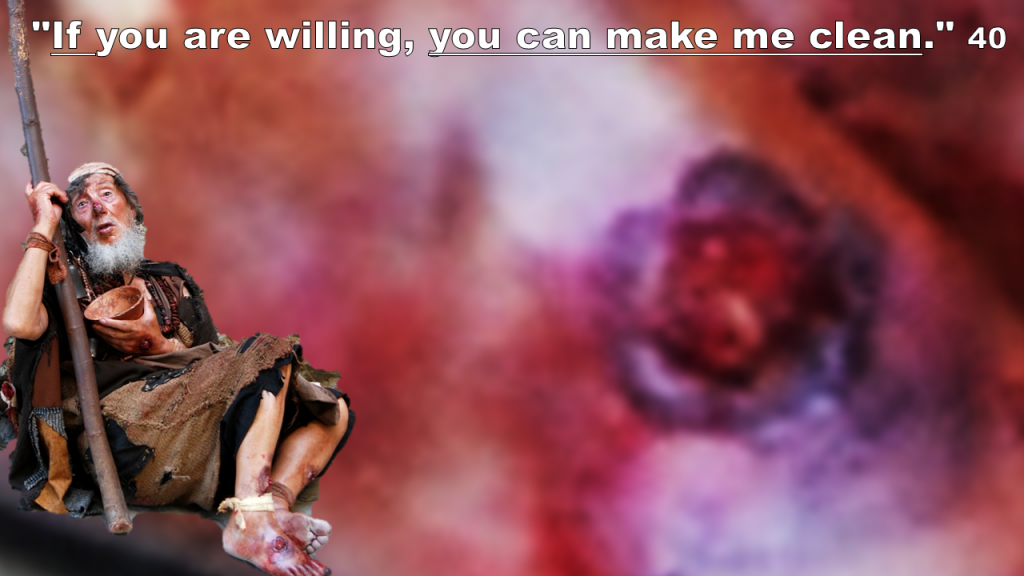 There was no doubt that Jesus had within him the power to heal this deadly, deforming, disease, called leprosy!
There was no doubt that Jesus had within him the power to heal this deadly, deforming, disease, called leprosy!
Where did this man get such faith? How did he know that Jesus could heal? Had he heard about all the people outside of Peter’s house that found that Jesus not only heals the sick but casts out demons? We can only assume he did because his earnest plea was full of faith! “… you can make me clean” (40).
And yet having been subjected to isolation for who knows how long, and having not had the simple pleasure of a hug in ages this dejected man did express some doubt. Didn’t he?
It appears from what he said that he wasn’t so sure that Jesus would chose to help him. That’s what this “if” is about. Why is it that, “It is sometimes easier to believe in God’s power than in his mercy” ?(Frank E. Gaebelein, ed., The Expositor’s Bible Commentary – Volume 8: Matthew, Mark, Luke, (Grand Rapids, MI: Zondervan, 1984), WORDsearch CROSS e-book, 630)
Have you found yourself there? You believe that God can do what you need Him to do but you just aren’t sure He’ll do it for you?
Why is it that we can believe in His power but not His mercy and grace?
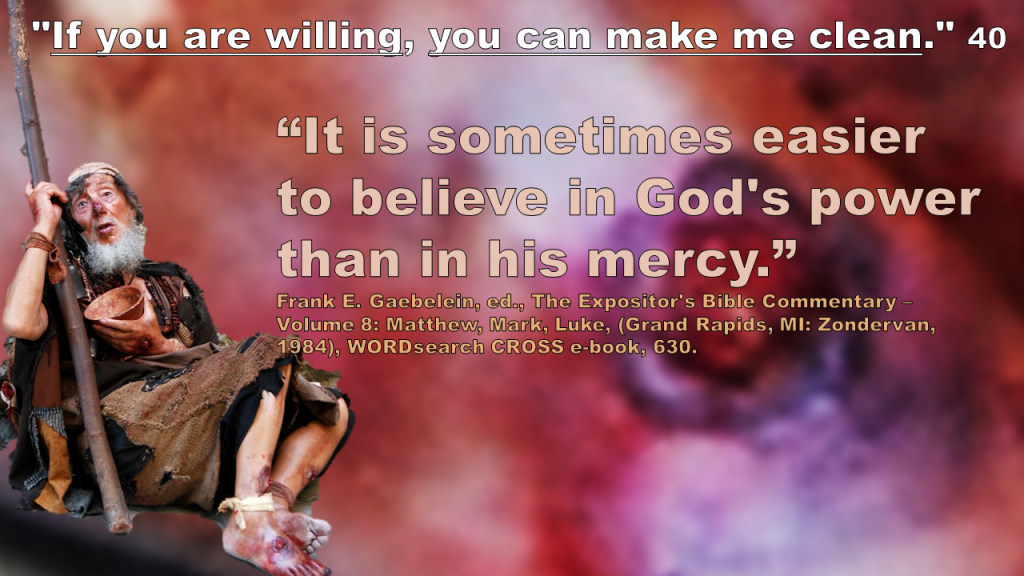 Somehow this man had faith that healing was in the realms of possibility. And he certainly knew there was nothing he himself could do to get rid of leprosy. But I believe he also knew that emotional sting along with the stench of this disease. The sting of isolation had created doubt. And that isolation caused him to doubt that anyone cared enough to help him at all. But that doubt was short lived.
Somehow this man had faith that healing was in the realms of possibility. And he certainly knew there was nothing he himself could do to get rid of leprosy. But I believe he also knew that emotional sting along with the stench of this disease. The sting of isolation had created doubt. And that isolation caused him to doubt that anyone cared enough to help him at all. But that doubt was short lived.
You got to love our Saviour’s response! And His compassion even at a time when Jesus was trying to avoid the crowds… it speaks volumes about our wonderful saviour.
If you look back just a couple of verses (Mark 1:30-39) you’ll see that Jesus had tried to escape the growing crowds of people wanting miraculous healings. He even snuck out under cloak of darkness to a secluded place so he could have a talk with His father uninterrupted (cf. Mark 1:36). And when the disciples finally found him and told him everyone is looking for you he said “let’s go somewhere else!” (Mark 1:38) But when this poor dejected man knelt before Him compassion welled up inside of Jesus.
And then He did the remarkable. He did what no one else had done since the day the man was sent away from that town. Jesus actually reached out …and touched the man! That’s the miracle here. He reached beyond his comfort zone, beyond the cultural taboos and touched a disease ridden man.
Now, scientists today are pretty sure that leprosy spreads through contact. Particularly through sneezing and coughing because of direct bodily fluid contact like most infectious diseases. And I’m sure when Moses, who was inspired by the Holy Spirit, set forth the laws concerning leprosy, God already knew it spread by contact. So there was good reason for social isolation. So when Jesus reached out and touched this man it was not the thing to do humanly speaking. It was the beginning of a miracle!
The fact is most of us might even find being in this man’s presence uncomfortable, never mind actually reaching beyond that discomfort and touching him. Even though today we know that the chances of actually getting leprosy from casual limited contact are slim indeed. And yet the stigma is still there big time.
But can you imagine for a moment the eyes of the disciples? Of Peter, James and John as they watched what Jesus just did? It would have been priceless to see their expressions as Jesus hand actually made contact. Since anyone who touches something unclean becomes unclean until evening at minimum according to the laws of Moses they would have been aghast! The Law which guided their thoughts and at convenient times even their actions was in them from childhood. They knew that no one was to touch a leprous man!
Yet that didn’t stop Jesus, he not only reached out, touched the man but answered that man’s question, “I am willing! Be clean!” (41).
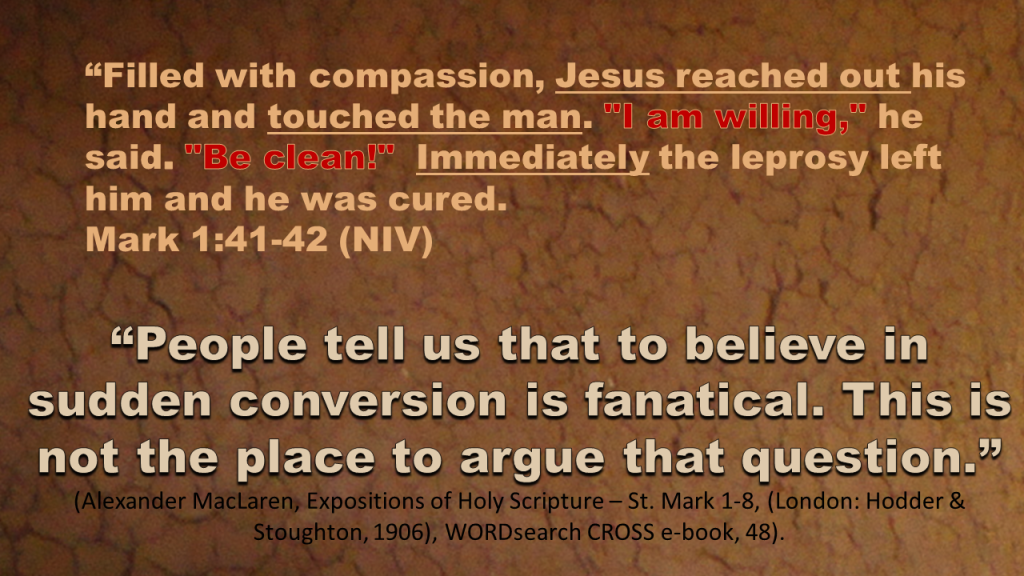 Alexander MacLaren writes, “People tell us that to believe in sudden conversion is fanatical. This is not the place to argue that question.” (Alexander MacLaren, Expositions of Holy Scripture – St. Mark 1-8, (London: Hodder & Stoughton, 1906), WORDsearch CROSS e-book, 48).
Alexander MacLaren writes, “People tell us that to believe in sudden conversion is fanatical. This is not the place to argue that question.” (Alexander MacLaren, Expositions of Holy Scripture – St. Mark 1-8, (London: Hodder & Stoughton, 1906), WORDsearch CROSS e-book, 48).
Immediately the leprosy left him and he was cured!(42) It was over in an instant! A few words of instruction and the Master was on his way. It has taken me much longer this morning to speak about this event then the event itself took!
But do you think, even for a moment, that this man, once the leprosy was gone, wanted to do what Jesus asked of him next?
We read in verses 43-44, “Jesus sent him away at once with a strong warning: “See that you don’t tell this to anyone. But go, show yourself to the priest and offer the sacrifices that Moses commanded for your cleansing, as a testimony to them” Mark 1:43-44 (NIV).
Funny isn’t it? He told that man, don’t tell a soul! And the man immediately told everyone he came in contact with. Warren Wiersbe so eloquently puts it,
“Jesus told this man to keep quiet, and yet he told everybody. Jesus commands us to tell everybody—and we keep quiet! (Warren W. Wiersbe, The Bible Exposition Commentary – New Testament, Volume 1, (Colorado Springs, CO: Victor, 2001), WORDsearch CROSS e-book, 114).
Jesus specially said to you and I, “… as you go, preach, saying, ‘The kingdom of heaven is at hand.’ “Heal the sick, raise the dead, cleanse the lepers, cast out demons. Freely you received, freely give…Go and make disciples of all nations baptizing them in the name of the Father and the Son and the Holy Spirit and teach them to obey everything I have commanded you. And surely I am with you until the end of the age…(Mat. 10:8, 28:19)…
But know this! “…whoever does the will of My Father who is in heaven, he is My brother and sister and mother.”(Matthew 12:50).
Those who go and tell the Good News, who make disciples…those are Jesus’s brother’s, and sisters… You mean like some poor leprous man who was healed but couldn’t follow the Master’s immediate orders?
But wait, doesn’t that make him one of the least of these? As well as one of Jesus brothers? Hmmm?
Why do you suppose Jesus said, “don’t tell anyone” to this once leprous man? Especially if He knew that the man wasn’t capable of keeping this secret between them? Why was that included in this passage?
Well some say that Jesus was using reverse psychology on him. You know, if you tell someone they can’t touch something they will likely prove you wrong quite quickly.
But other scholars seem to think it was because Jesus didn’t want that kind of publicity. He wasn’t looking to become the best magic show in town. Jesus had come to bring salvation from God, to restore wholeness to broken humanity not just heal disease, but something far more important.
But to this man who was isolated and hurting physically, emotionally and spiritually, the sudden release from the prison he was in was overwhelming good news! There was no keeping that a secret!
That kind of good news is just too much to keep inside! So that man “went out and began to talk freely, spreading the good news.
There were consequences to his actions though! It’s right there in the text. Verse 45.
As a result, Jesus could no longer enter a town openly but stayed outside in lonely places. Yet the people still came to him from everywhere” Mark 1:45 (NIV).
“Surely you can see how Jesus took up our infirmities and carried our sorrows …” Isaiah 53:4 (NIV)?
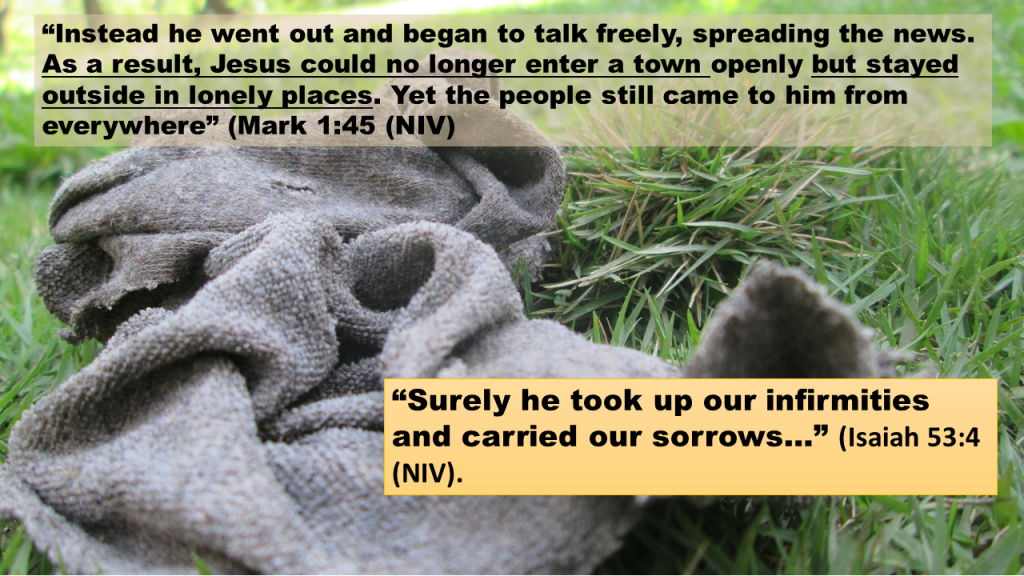 Did you notice? Did you notice Who was then the one on the outside looking in? Did you notice Who was now in a sense the outcast, the one in forced isolation?
Did you notice? Did you notice Who was then the one on the outside looking in? Did you notice Who was now in a sense the outcast, the one in forced isolation?
Mark says, “Jesus could no longer enter a town openly…he had to stay outside in lonely places!” Could that be why He asked the man to keep it to himself? To do as Moses commanded, and give glory to God the old fashioned way?
And yet that’s our Saviour! He was willing to trade places so that the very illness that separated us from God could be remove once for all. And it cost Him His very life on the cross. And that was only the beginning as we saw last week. He has risen!
Jesus still answers our prayers of desperation with those words that brought healing and comfort to that leprous man. “I am willing, Be Clean!” (41).
And that kind of takes us full circle to where we started today. Back to Matthew 25. Back to the least of these. Who are the least of these? Is it the poor, the imprisoned, the outcasts? Well, actually the answer is right there in what Jesus said.
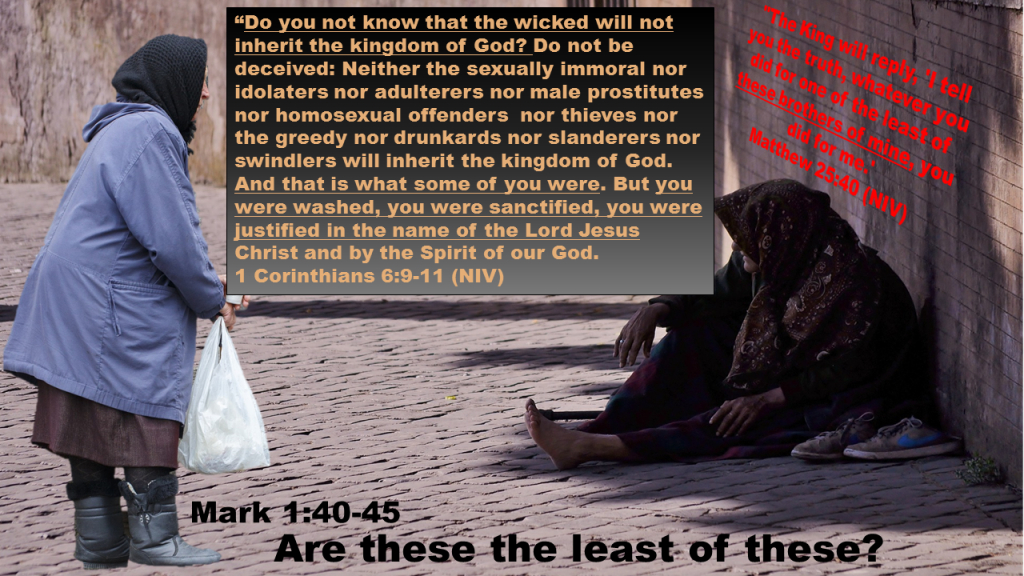 I don’t know how I missed it for so long. It’s not talking about those who are goats, who Christ said, “I tell you the truth, whatever you did not do for one of the least of these, you did not do for me.’ …they will go away to eternal punishment, but the righteous to eternal life.” Matthew 25:46 (NIV). They are the ones who mocked the Master and persecuted His brothers, and sisters and even His mother! These goats are NOT “the least of these”.
I don’t know how I missed it for so long. It’s not talking about those who are goats, who Christ said, “I tell you the truth, whatever you did not do for one of the least of these, you did not do for me.’ …they will go away to eternal punishment, but the righteous to eternal life.” Matthew 25:46 (NIV). They are the ones who mocked the Master and persecuted His brothers, and sisters and even His mother! These goats are NOT “the least of these”.
The least of these are you and I and everyone who, having been set free by the master and having gone out and, talked freely, spreading the good news, even if it meant we went hungry, thirsty, or naked! And trust me there are plenty in foreign lands who fit those descriptions. Many who are forced into isolation or imprisoned or beaten and murdered because of Christ’s name on their lips. Jesus says to them as well as you and I:
“… ‘Come, you who are blessed by my Father; take your inheritance, the kingdom prepared for you since the creation of the world. For I was hungry and you gave me something to eat, I was thirsty and you gave me something to drink, I was a stranger and you invited me in, I needed clothes and you clothed me, I was sick and you looked after me, I was in prison and you came to visit me.’ “Then the righteous will answer him, ‘Lord, when did we see you hungry and feed you, or thirsty and give you something to drink? When did we see you a stranger and invite you in, or needing clothes and clothe you? When did we see you sick or in prison and go to visit you?’ “The King will reply, ‘I tell you the truth, whatever you did for one of the least of these brothers of mine, you did for me.’
Matthew 25:34-40 (NIV)
They are the ones that Christ said is our brothers and sisters to whom we had the privilege of feeding and clothing, visiting and even giving a cup of water in His name! AMEN?
Read Mark 1:40-45 in several versions. Then read Matthew 25:31-46 and begin the lesson.
1. Are there people you find uncomfortable to be around? Why is that? What makes you or them uncomfortable to be around?
2. Who is Jesus referring to in the Matthew 25 passage as “the least of these”?
3. What do we immediately find out about the man in Mark 1:40?
4. What do you know about his infirmity?
5. How would you define his disease Biblically? What does the Bible say about it?(see also Lev. 13:1-46; Num 12:10-15; Deut 24:8-9; 2 Samuel 3:29; 2 Kings 5:27; 2 Kings 7:3-4; 2 Kings 15:5; Luke 17:12-19)
6. Do people today still suffer from that disease? (Ask mr. google for statistics, you may be surprised!)
7. What did the man do when he met Jesus? (Mark 1:40) Why is it easier for us to believe in God’s power than in His mercy and Grace?
8. How did Jesus respond to the man’s faith and doubt? (see also Mark 6:34; Luke 7:12-13; Heb 1:3; Heb 4:15; Ps. 33:9)
9. There was more than one miracle mentioned in verses 41 and 42 what were they?
10. Why did Jesus strongly warn the man in verse 43? (Mark 7:36; Matthew 9:30; Luke 8:56)
11. What did Jesus tell the man to do? (Mark 1:44; see also Lev. 14:2-32)
12. What did the man actually do? (Mark 1:45) What is so funny about that? (See comment in my notes)
13. Who actually are “the least of these” according to Matthew 25:40?
14. Is there a person that makes you uncomfortable that you need to help this week? Who should you see in them?


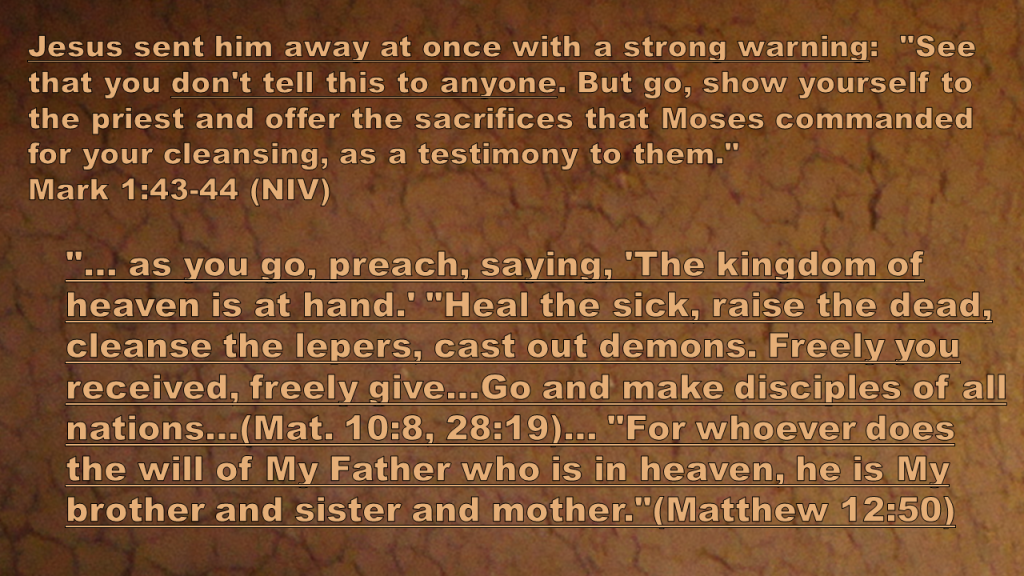
You must be logged in to post a comment.